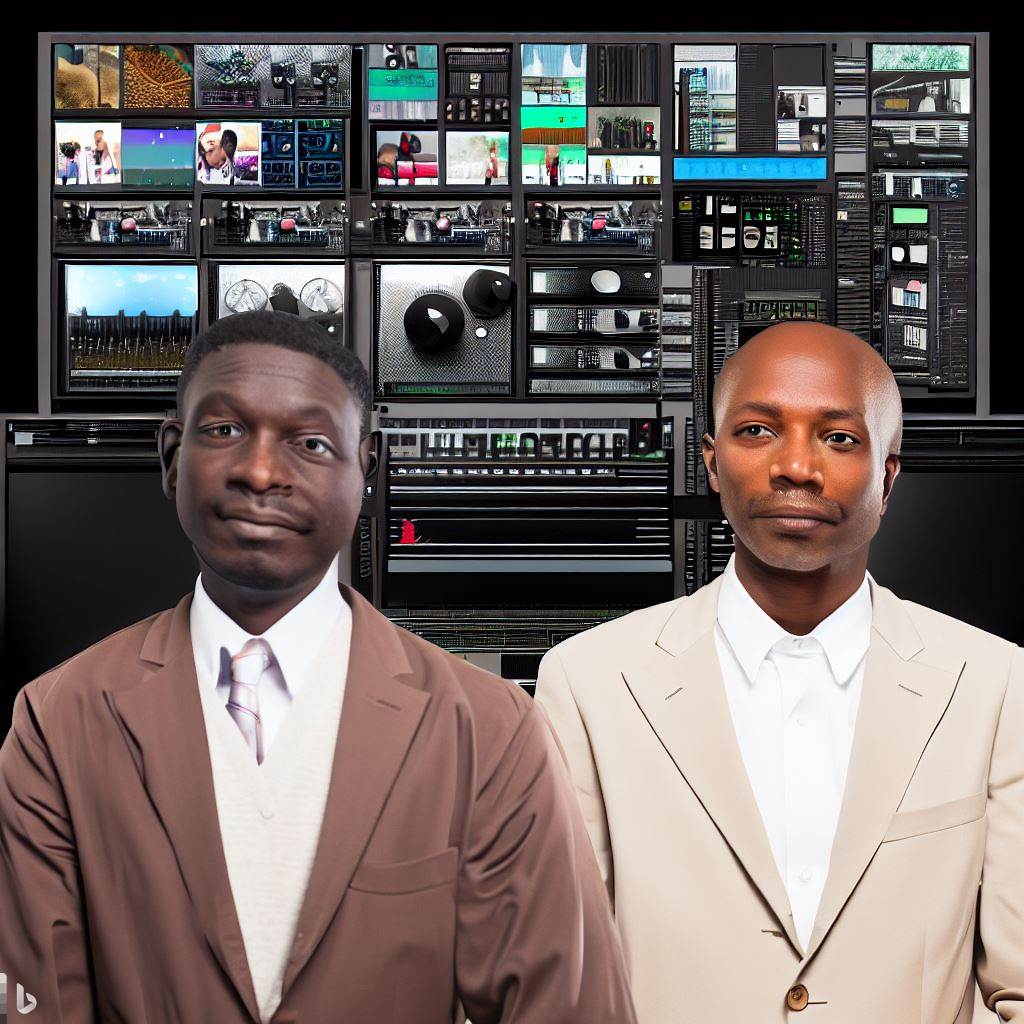The Evolution of Television Editing in Nigeria
Last Updated on August 26, 2023
Introduction
Television editing in Nigeria has experienced significant changes over the years.
Television editing plays a crucial role in media production by enhancing the overall quality and impact of content.
Tracing Nigeria’s journey in television editing, a dynamic and transformative process.
This chapter delves into the remarkable progression of television editing within Nigeria’s media landscape.
- Analog Era: Early television editing relied on physical cuts, splices, and linear workflows.
- Technological Leap: Digital editing software streamlined the process, enabling non-linear, efficient editing.
- Visual Effects Integration: Advanced tools added visual depth and creativity to storytelling, enhancing viewer engagement.
- Rapid Content Turnaround: Digital editing boosted production speed, ensuring timely broadcast of news, shows, and events.
- Future Possibilities: As technology advances, Nigeria’s television editing landscape continues to evolve, shaping captivating visual narratives.
Understanding the evolution of television editing underscores its transformative impact on Nigerian media production and storytelling.
This blog post aims to explore the evolution of television editing in Nigeria, examining its advancements, challenges, and impact on the industry.
Historical overview of television editing in Nigeria
The early development of television editing in Nigeria
- Introduction to television editing in Nigeria in the early years.
- Limited resources and lack of technical expertise hindered the growth of television editing.
- Television editing was initially outsourced to foreign countries due to the lack of local expertise.
- Nigerian Television Authority (NTA) played a significant role in the development of television editing.
- The establishment of editing studios within NTA stations marked a turning point in local television editing.
Major milestones and advancements in television editing techniques
- Introduction of linear video editing systems revolutionized television editing in Nigeria.
- Non-linear editing systems brought a significant shift in the editing process.
- Adoption of digital video editing enhanced the efficiency and quality of television editing.
- Advancements in computer graphics and animation transformed the visual effects in television editing.
- Introduction of High Definition (HD) technology further improved the viewing experience.
Explain the impact of international influences on Nigerian television editing
- International collaborations allowed Nigerian editors to learn and adapt new techniques.
- Exposure to international television content inspired Nigerian editors to push their creative boundaries.
- Foreign movies and TV shows influenced Nigerian television editing styles and storytelling techniques.
- International award recognitions elevated the status of Nigerian television editing on a global scale.
- The influx of foreign media professionals brought fresh perspectives and further accelerated the growth of television editing in Nigeria.
Basically, the historical overview of television editing in Nigeria showcases the journey from limited resources and technical expertise to the adoption of advanced editing techniques.
The early development of television editing was marked by challenges and reliance on foreign expertise.
However, with the establishment of editing studios within NTA stations and the introduction of new technologies, television editing in Nigeria has witnessed significant advancements.
International influences have played a vital role in shaping the skills and techniques of Nigerian editors, leading to the elevation of Nigerian television editing on a global platform.
The evolution of television editing in Nigeria continues to be driven by technological advancements and the pursuit of creative excellence.
Read: How to Succeed as a Television Producer in Nigeria
Traditional television editing practices in Nigeria
Typical editing techniques used in early Nigerian television
- Nigerian television editing in its early days was predominantly linear, with shots following one another chronologically.
- Montages were rarely used, and instead, scenes were edited in a straightforward manner to depict the story.
- Transitions between shots were simple, mainly consisting of cuts, fades, and dissolves.
- The emphasis was on continuity editing, ensuring the flow and coherence of the narrative.
- Long takes were common due to limited resources and technology.
- Editors focused on maintaining coherence between shots and ensuring smooth action progression.
- Editing decisions were primarily based on the linear structure of the story and character development.
- Visual effects and advanced post-production techniques were virtually non-existent.
- Editors relied on creative shot selection and composition to convey the intended message.
Challenges faced by editors due to limited resources and technology
- Early Nigerian television editing faced the challenge of limited equipment and technical resources.
- The scarcity of editing facilities and trained personnel made the editing process arduous and time-consuming.
- Editors had to work with outdated equipment, which affected the overall quality of editing.
- Access to high-quality footage and sound was often challenging, resulting in compromised editing results.
- Editors had to rely on manual editing techniques, such as splicing and physically cutting the film strips.
- The lack of computerized editing systems made it difficult to experiment with different editing styles and techniques.
- The shortage of financial resources limited the scope of editing possibilities and professional development.
- Despite these challenges, editors in Nigeria displayed remarkable creativity and resourcefulness in their work.
The significance of storytelling and narrative structure in Nigerian television editing
- Storytelling is a vital element in Nigerian television editing, as it connects with the audience on an emotional level.
- Edit decisions are made to enhance the narrative structure and engage viewers throughout the story.
- Nigerian television editing seeks to convey cultural values, traditions, and societal issues effectively.
- Editors strive to create a compelling narrative flow that captures the attention and interest of the audience.
- Character development and plot progression are crucial focal points in Nigerian television editing.
- The use of specific editing techniques, such as cross-cutting and parallel editing, helps weave multiple storylines together.
- Narrative pacing and rhythm are carefully crafted to create a captivating viewing experience.
- Nigerian television editing aims to strike a balance between entertainment and educative content.
- The power of editing lies in its ability to shape the story, evoke emotions, and influence audience perception.
Generally, traditional television editing in Nigeria followed linear storytelling techniques, faced challenges due to limited resources and technology, and focused on narrative structure.
Editors relied on simple editing techniques and creativity to convey the intended message effectively.
Despite the constraints, Nigerian television editing played a significant role in connecting with audiences and conveying cultural values through storytelling.
Read: Behind the Scenes: A Day in the Life of a Nigerian TV Producer
Technological advancements and their impact on television editing in Nigeria
In recent years, technological advancements have had a significant impact on television editing in Nigeria.
Introduction of digital editing tools and software
The introduction of digital editing tools and software has revolutionized the editing process, making it faster and more efficient.
- Digital editing tools allow editors to manipulate footage with ease, making it possible to create seamless transitions and enhance visual effects.
- The use of software such as Adobe Premiere Pro and Final Cut Pro has become widespread in the industry, enabling editors to work on their projects with greater flexibility and precision.
- These digital editing tools and software have also made it easier to create high-quality content, resulting in more visually appealing and engaging television programs.
How the accessibility of technology has democratized television editing in Nigeria
Furthermore, the accessibility of technology has democratized television editing in Nigeria.
In the past, editing equipment and software were expensive and only accessible to a few professionals.
- However, with the advent of cheaper and more accessible editing tools and software, more people now have the opportunity to pursue a career in television editing.
- Amateur editors can now acquire the necessary equipment and software at affordable prices, allowing them to practice their skills and improve their craft.
- This has led to a wider pool of talent in the industry, fostering creativity and competition among editors in Nigeria.
Positive and negative effects of technological advancements on Nigerian television editing
Nevertheless, technological advancements have brought both positive and negative effects on Nigerian television editing.
- On the positive side, technology has significantly improved the quality of editing and post-production processes in Nigeria.
- Editors now have access to a wide range of tools and software that can enhance the visual and auditory aspects of television programs.
- This has resulted in a higher standard of production quality, attracting viewers and advertisers to Nigerian television.
On the other hand, the reliance on technology has also led to certain challenges in television editing in Nigeria.
- Some editors become over-reliant on software, neglecting important traditional skills such as storytelling and narrative structure.
- Furthermore, the constant need to keep up with new technologies can be overwhelming for editors, as they constantly need to upgrade their skills and knowledge.
Overall, technological advancements in television editing have had a profound impact on the industry in Nigeria.
The introduction of digital editing tools and software has made the editing process faster and more efficient.
The accessibility of technology has democratized television editing, allowing more people to pursue a career in the field.
While there are positive effects, such as improved production quality, technology also presents challenges to editors, such as over-reliance and the need for constant skill development.
As technology continues to evolve, it is important for Nigerian editors to adapt and embrace new advancements to stay relevant in the industry.
Read: The Role of TV Producers in Nigeria’s Entertainment Growth

Notable Nigerian television editors and their contributions to the field
Prominent names in Nigerian television editing
- Tunde Kelani: Renowned for his work as a television editor in Nigeria.
- Anita Odia: Well-known for her exceptional editing skills in the Nigerian television industry.
- Emeka Okafor: A highly respected television editor who has made significant contributions to the field.
- Funke Obisanya: Recognized for her remarkable editing techniques and expertise.
- Adeoluwa Adenuga: Known for his proficiency in television editing and his impact on the industry.
Their notable works and contributions to the industry
- Tunde Kelani: He played a pivotal role in editing the acclaimed television series “Saworoide,” which garnered critical acclaim and became a milestone in Nigerian television production.
- Anita Odia: Her exceptional editing skills were showcased in the highly successful TV series “Tinsel,” where she added a unique touch to each episode, enhancing the overall viewing experience.
- Emeka Okafor: Known for his impeccable editing work on popular soap operas like “Checkmate” and “Fuji House of Commotion,” which gained massive popularity among Nigerian audiences.
- Funke Obisanya: She made profound contributions to the field with her impeccable editing of the groundbreaking TV drama series “Super Story.” Her seamless edits heightened the emotional impact of each episode, captivating viewers.
- Adeoluwa Adenuga: Recognized for his exceptional editing work on various reality TV shows, including “Nigerian Idol” and “Gulder Ultimate Search.” His expertise in creating engaging and dynamic content revolutionized the genre.
The influence of these editors on the evolution of television editing in Nigeria
These notable Nigerian television editors have significantly contributed to the evolution of television editing in Nigeria.
Through their remarkable skills and expertise, they have revolutionized the industry and set new standards for editing techniques.
Tunde Kelani
Tunde Kelani’s masterful editing in “Saworoide” introduced innovative storytelling techniques, inspiring future television editors to experiment with their craft.
His work showcased the power of editing in creating immersive narratives and solidified the importance of post-production in television production.
Anita Odia
Anita Odia’s exceptional editing on “Tinsel” demonstrated the impact that precise and creative editing can have on a TV series.
Her contributions raised the bar for editing in Nigeria, encouraging others to push boundaries and explore new approaches.
Emeka Okafor
Emeka Okafor’s work on popular soap operas influenced the pace and style of Nigerian television.
His editing choices in shows like “Checkmate” and “Fuji House of Commotion” created a template for future editors, emphasizing the importance of rhythm and pacing in storytelling.
Funke Obisanya
Funke Obisanya’s contributions to the iconic TV drama series “Super Story” demonstrated the artistry of editing in emphasizing emotional beats and creating memorable television moments.
Her edits shaped the overall narrative structure, heightening the impact of each episode and captivating audiences.
Adeoluwa Adenuga
Adeoluwa Adenuga’s dynamic editing on reality TV shows brought a fresh perspective to the genre.
Through his innovative techniques and storytelling prowess, he revitalized reality television in Nigeria, making it more engaging and appealing to viewers.
Essentially, the notable Nigerian television editors mentioned above have left an indelible mark on the evolution of television editing in Nigeria.
Their exceptional skills, groundbreaking works, and significant contributions have propelled the industry forward, inspiring a new generation of editors to push boundaries and continue pushing the art of television editing in Nigeria to new heights.
Read: How Digital Transformation is Affecting TV Producers in Nigeria
Current trends and future possibilities in Nigerian television editing
Emerging editing styles and techniques in contemporary Nigerian television
- Faster pacing and shorter durations have become popular in Nigerian television editing.
- Montage editing technique is being utilized to convey information quickly and efficiently.
- Non-linear editing systems have revolutionized the way Nigerian television shows are edited.
- The use of jump cuts and fast cuts has become prominent in creating a dynamic visual experience.
- Multi-camera editing is commonly employed in Nigerian sitcoms and talk shows for seamless transitions.
Integration of visual effects and CGI in television editing
- Nigerian television editing has started to incorporate visual effects and CGI to enhance storytelling.
- Green screens are increasingly being used to create realistic backgrounds and settings.
- CGI is employed to create extraordinary and fantastical elements in Nigerian television shows.
- The integration of visual effects and CGI has led to a more immersive viewing experience for audiences.
- Nigerian editors are now trained in various software and techniques to execute visual effects seamlessly.
Potential future advancements and trends in Nigerian television editing
- Virtual reality and augmented reality could play a significant role in Nigerian television editing.
- Artificial intelligence could assist editors in automating repetitive tasks, saving time and effort.
- Advanced color grading techniques may become more prevalent in Nigerian television editing.
- Personalized editing experiences may emerge, allowing viewers to customize their viewing preferences.
- Collaborative editing tools and cloud-based editing platforms could facilitate remote editing processes.
In general, Nigerian television editing is experiencing significant advancements in terms of editing styles, techniques, and visual effects integration.
Faster pacing, non-linear editing systems, and multi-camera setups have become common in Nigerian television.
The integration of visual effects and CGI is enhancing storytelling and creating immersive viewing experiences.
Looking to the future, advancements in virtual reality, artificial intelligence, and personalized editing experiences could revolutionize the industry.
Nigerian editors should continuously adapt and embrace new technologies to stay at the forefront of television editing.
Conclusion
The blog post highlighted the evolution of television editing in Nigeria, covering key aspects and developments.
Television editing plays a crucial role in the Nigerian media industry, shaping narratives and enhancing content quality.
Television editing in Nigeria mirrors technological advances, revolutionizing content creation and enhancing viewer experiences.
- Shaping Narratives: Editing innovations enrich storytelling, captivating audiences and conveying impactful messages.
- Production Efficiency: Digital tools streamline workflows, enabling faster content creation and diverse visual effects.
- Cultural Expression: Evolving editing techniques reflect Nigeria’s dynamic culture and amplify local narratives.
- Viewer Engagement: Editing’s evolution ensures compelling and immersive content, attracting wider viewership.
- Industry Progress: Embracing technological strides, Nigeria’s television editing sector continually propels media excellence.
As Nigeria’s media landscape evolves, television editing remains a pivotal force, narrating stories with captivating resonance.
As technology advances, television editing in Nigeria will continue to evolve, allowing for more creativity and improved storytelling.


